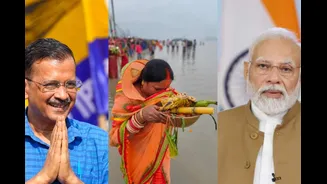Once again, the festival of Chhath Puja has become a flashpoint in Delhi politics, with the ruling Bharatiya Janata Party (BJP) and opposition Aam Aadmi Party (AAP) locking horns over arrangements at the Yamuna
ghats. The controversy comes ahead of Prime Minister Narendra Modi’s planned participation in Chhath Puja at Vasudev Ghat in north Delhi on Tuesday, October 28.
AAP accuses BJP of making “artificial Yamuna” for PM Modi
The AAP has accused the Delhi BJP government of creating an “artificial Yamuna” at Vasudev Ghat by filling an artificial pool with filtered water for the Prime Minister’s ceremonial dip. AAP leaders claimed that while the Prime Minister would offer prayers in this specially prepared pool, ordinary devotees were forced to wade into the polluted river.
AAP chief Arvind Kejriwal described the move as a “mockery of the sacred Chhath festival,” adding that BJP’s actions disregarded the sentiments of Purvanchali devotees.
Saurabh Bharadwaj, AAP Delhi unit president, echoed this criticism, saying, “Prime Minister Modi will celebrate Chhath in a filtered-water Yamuna, while our poor Purvanchali brothers and sisters are being forced to offer prayers in the filthy, polluted waters of the real Yamuna.”
AAP released a video highlighting the disparity, claiming other ghats were contaminated with high faecal coliform levels, posing serious health risks. Leader of Opposition Atishi termed the situation “outright discrimination,” while Bharadwaj challenged BJP leaders to an open debate on Yamuna pollution.
BJP denies allegations
Responding to AAP’s accusations, Delhi BJP president Virendra Sachdeva dismissed the claims as “baseless political drama.” He accused the opposition of deflecting from its governance failures and suggested their frustration stemmed from electoral setbacks.
Sachdeva defended the preparations, saying the BJP-led government had ensured “unprecedented arrangements” for devotees, including clean ghats, proper lighting, and safety measures. He also questioned AAP’s record on river cleaning, asking where Rs 6,500 crore allocated for Yamuna restoration had gone under their tenure.
“The people of Delhi know which party truly works for their faith and culture,” Sachdeva said, adding that pollution is a year-round problem, not a seasonal political tool.
Yamuna pollution
The political debate coincides with environmental warnings. The latest Delhi Pollution Control Committee (DPCC) report shows that Yamuna’s water remains unfit for bathing across most parts of the city, except at Palla. The river continues to register high ammonia and biochemical oxygen demand (BOD) levels, indicating severe organic pollution.
Despite claims of improved preparations, the condition of the river remains a key concern for devotees who come to Delhi from Bihar, Uttar Pradesh, and other regions to observe the festival along the sacred riverbanks.
This year, the exchanges take place even though Delhi’s state elections are still over four years away. AAP has accused BJP of politicising Chhath Puja, suggesting that elaborate arrangements were aimed at impressing Purvanchali voters ahead of Bihar Assembly polls.












